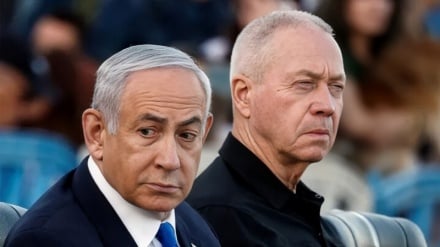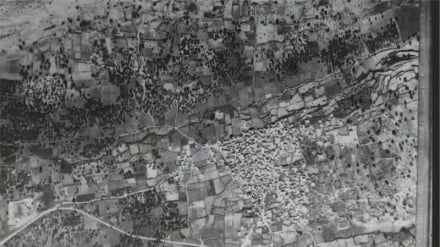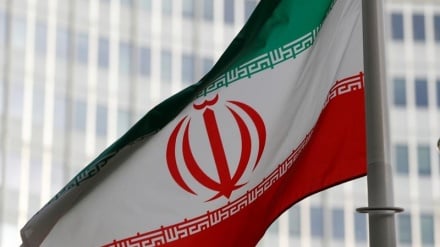Israel's true face in documentary cinema
The new generation of Palestinian filmmakers needs, more than everything, to refer to the past history and present condition of its land.
In view of this, historical documents and documentary films are good sources for research on Palestine's people, culture and identity. What has contributed to the global fame of the Palestinian cinema in the recent years was the documentary cinema and the activities of filmmakers working in this domain.
The first program of the new round of "Tehran Cinema Tech" was witness to screening of the film, "The18 Wanted". This 75-minute documentary has in fact ridiculed the efforts of Zionists to counter the Palestinian people during their first Intifada. This documentary is directed by Amer Shomali and Paul Cowan. Amer Shomali was born in Kuwait and lives in Ramallah. He has narrated the calamities of the Palestinian nation in the aftermath of the first Intifada of 1987.
The film is the account of the people of a village who easily succeeded to become self-sufficient against the Israeli products.
A group of Palestinians in Beit Sahour village, east of Bethlehem, bought 18 cows from the Zionist regime and founded a corporation called, "Lion of Intifada" and the villagers became needless of Israeli products and banned their products. After banning the Israeli products by villagers, this issue turned into a political event so that the Zionist officials decided to take those cows back. This documentary has interviewed some of the eye witnesses of the first Intifada and the animation of cows is shown while they are speaking. Then pictures of Yitzhak Robin who threatens the villagers of using force are also shown. The Zionist regime army was in fact been ordered to confiscate and arrest those cows because they had threatened the national security of Israel!!!!!
One of the eye witnesses speaks of the success of the locals to hide the cows and make them escape out of the eyes of Israelis.
Amer Shomali beautifully portrays the refusal of the villagers to pay tax to the Zionist regime and the consequent siege of the village by the fake Zionist regime. Then the siege of the village finds global dimensions so that the UN calls it as an inhumane measure. The documentary "The 18 Wanted" was screened at Toronto Film Festival in 2014 for the first time and then was displayed at Montreal Festival and the cities of Abu Dhabi and Carthage. This film was awarded at the Traverse City Film Festival. Palestinians chose the film as their representative at Oscar 88, though it was obvious that it wouldn't win any prize. The director of the documentary "The 18 Wanted" has lived in Ramallah for years and sent his work to the Human Rights Festival in the US, too. But Israelis didn’t permit him enter Bayt ul-Moqaddas to get his visa for the US, saying that Shomali is a threat to Israel's security.
The Palestinian cinema, as a new phenomenon, has recently taken big strides by noted figures like Elia Suleiman and Hany Abu Assad. In the past, the Palestinian filmmaking industry was under the shadow of the Egyptian cinema and other Arab countries. But for the past 15 years, a cultural rebirth introduced a new generation of filmmakers. These young people, in rivalry with acclaimed filmmakers, have attained self-confidence in depicting personal experiences in the form of shocking stories; and have tried to use metaphor instead of reality to present it to the world.
While the western viewer is more familiar with the new works of Palestinian directors like Elia Suleiman, Rashid Masharawi and Tawfik Abu Wael, the film industry in Palestine dates back to early 20th century.
Palestinians began producing films in the 1960s. Before that, although some 100 documentary works had been made on the issue of occupation and struggles of the people to liberate their homeland from the Zionist yoke, those works had been made in Syria, Lebanon, Iraq, Algeria and Tunisia.
At first, the only films that were made in Palestine were the political documentaries on the disasters of refugees in camps, the Israeli oppression and atrocities and the necessity of armed struggle against Israelis. The majority of cinematic products in 1973-1977 were on these issues. In fact, it was in late 1980s that Palestinians succeeded in winning global awards for their films.
Till 1987, almost 52 films were made by homeless Palestinians. Then, with the start of Intifada, the center of filmmaking was transferred to Gaza and the West Bank. Michel Khleifi was the first Palestinian film writer and director who, with his film "Wedding in Al-Jalil (1987)", acted as a trendsetter for next directors like Suleiman and Masharawi. Later on, Hana Elias and Hany Abu Assad continued Masharawi's path with long documentaries on the life in refugee camps; while making use of comedy to show the hardships and woes of Palestinians and the chronic oppression exercised against them.
While politics had overshadowed every cultural aspect of the Palestinian nation, including cinema, countering the obstructionism of Zionists and changing the western view on Palestinians, was the ideal of filmmakers who intended to show the real picture of Palestine. A new generation of directors dedicated themselves to the cause of Palestine and shared their personal experience as a refugee in the Occupied Territories. In spite of progresses in digital technology in the recent years, Palestinian filmmakers have hardly been able to access such technology and equipment; hence, they have been forced to send their works abroad, often to Europe, for finishing stages. This has been very costly for independent filmmakers.
The Palestinian cinema is looking for better chances to attract audiences in the global arena. Palestinian filmmakers, both documentary and fiction, have chosen homelessness, oppression, and life in the midst of war as the subject matter for their films to further disclose the criminal face of the child-killer regime in Tel Aviv to the world people.
RM/EA


